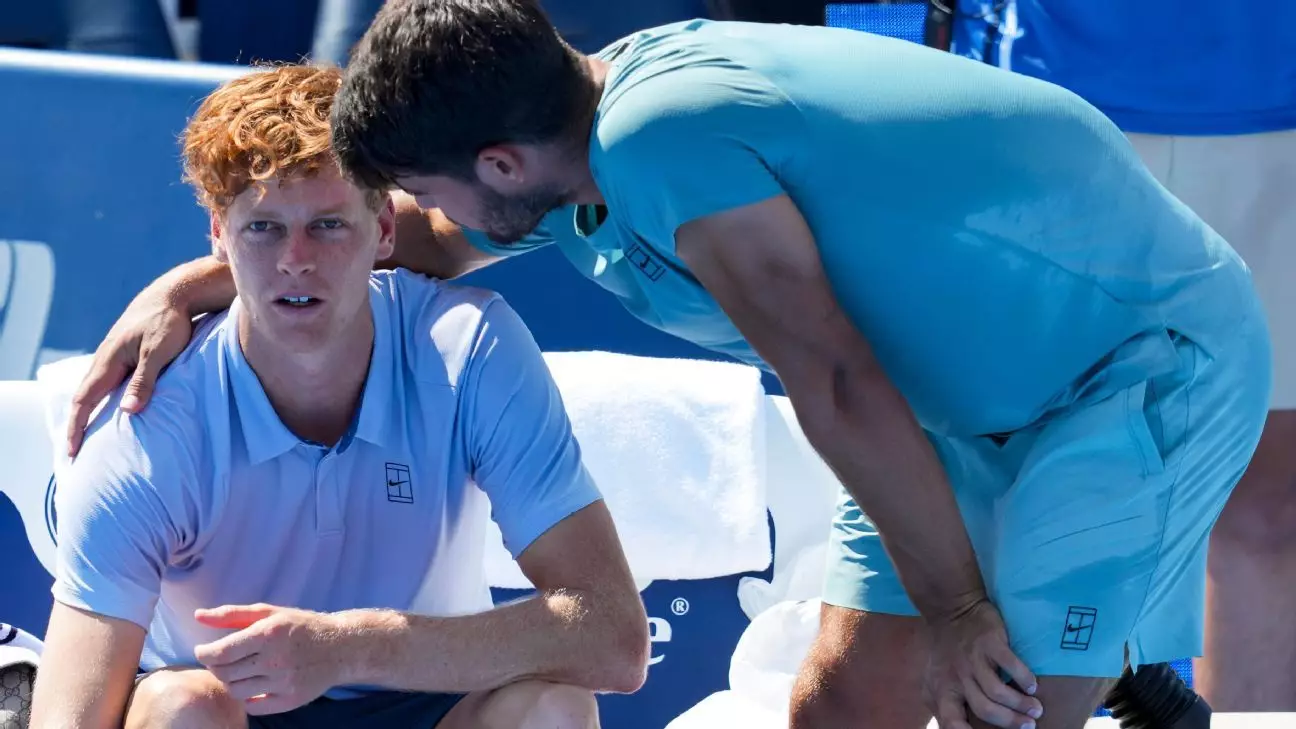The Cincinnati Open, one of the most prestigious hard court tournaments leading up to the US Open, witnessed an unusual and dramatic climax this year. Instead of a fiercely contested battle, spectators were met with an abrupt ending—courtesy of unforeseen health issues. Top-seeded Jannik Sinner, who was riding high after a remarkable winning streak, was forced to retire early in the final against Carlos Alcaraz. This unforeseen turn not only altered the course of the tournament but also underscored the unpredictable nature of sports, where physical condition can swiftly overshadow skill and strategy.
The match, which was anticipated as a showcase of two of today’s brightest talents, unraveled within just 22 minutes. Sinner appeared to struggle from the outset, visibly hampered and burdened by illness that was evidently present during the early stages of the match. His brief stand was marred by nine unforced errors in just a few games, and at one point, he was seen with an icepack on his head—a poignant symbol of a player trying to fight through discomfort. The clinical reality was harsh: health issues overwhelmed the competitive spirit, forcing Sinner to withdraw rather than risk worsening his condition.
The Significance of the Withdrawal and Its Context
Retirements in finals are rare, especially at major tournaments, making this incident particularly noteworthy. Historically, the Cincinnati men’s final has been a battleground for legends like Djokovic and Federer, with retirements mostly associated with injuries rather than illness. Sinner’s withdrawal adds a somber chapter to this narrative, reminding us that even in peak physical condition, athletes are vulnerable.
This scenario also shines a spotlight on the fragility of tennis careers and the importance of health management. Sinner, who had been unbeaten in 26 consecutive hard court matches, was a favorite to defend his title and potentially cement his place among the top echelon of players. His sudden health setback underscores that success is not solely determined by skill, but also by resilience and physical well-being—elements that can sometimes escape even the most promising talents.
Alcaraz’s Resilient Victory and the Broader Implications
For Carlos Alcaraz, this victory was more than just a trophy; it was a testament to perseverance. Having previously lost in Cincinnati final, he entered this year’s event with clear intentions to clinch the title and prove his dominance on hard courts. The victory, albeit unexpected, served as a powerful reminder of his mental toughness and ability to capitalize on opportunities.
Alcaraz’s comments reflected a maturity beyond his years; expressing concern for Sinner’s health and a desire for his opponent’s recovery, he embodied the true spirit of sportsmanship. His victory also demonstrates a psychological edge—capitalizing on adversity and showcasing the ruthless drive that has made him one of the brightest stars in tennis.
Furthermore, this incident highlights the tournament’s significance as a precursor to the US Open. Historically, Cincinnati champions have often gone deep into the Grand Slam, and Alcaraz’s win can be viewed as an affirmation of his readiness for the challenges that await in New York. His continued ascendancy solidifies his place among the favorites for this year’s US Open.
The Broader Narrative: Resilience in the Face of Adversity
While the match’s early conclusion was disappointing on the surface, it invites a more profound reflection on resilience—a trait that defines the very essence of sports. Athletes often battle physical and mental hurdles; sometimes, injuries or illnesses are beyond their control. Sinner’s early exit is a reminder that victory is not guaranteed, even for those on winning streaks.
For Alcaraz, this moment underscores a crucial lesson: success often requires seizing opportunities amid chaos. His composure, focus, and readiness to accept the crown epitomize the qualities that will serve him well as he hopes to translate success from this moment into a shot at the US Open title.
Ultimately, this Cincinnati final was more than a mere match—it’s a testament to the unpredictable, brutal, yet compelling nature of professional tennis. It emphasizes that sometimes, destiny changes not by the skill on display but by the resilience and health of the athletes involved. The true champions are those who can adapt, recover, and turn adversity into an affirmation of their strength. Carlos Alcaraz’s victory, born out of circumstances beyond his control, is a shining example of that enduring spirit.

